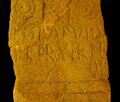NO·27
| Inscription | |
|---|---|
| Reading in transliteration: | komeuiọṣ / kalatikn / os |
| Reading in original script: | |
|
| |
| Object: | NO·27 Dormelletto (stela) |
| Position: | front, centre |
| Orientation: | 0° |
| Direction of writing: | dextroverse |
| Script: | North Italic script (Lepontic alphabet) |
| adapted to: | Latin script |
| Letter height: | 5.5–7.5 cm2.165 in <br />2.953 in <br /> |
| Number of letters: | 18 |
| Number of words: | 2 |
| Number of lines: | 3 |
| Workmanship: | carved |
| Condition: | complete |
|
| |
| Archaeological culture: | La Tène C [from object] |
| Date of inscription: | second half of 2nd c. BC [from object] |
|
| |
| Type: | unknown |
| Language: | Celtic |
| Meaning: | 'Komeuios son of Kalat(i)os' |
|
| |
| Alternative sigla: | none |
|
| |
| Sources: | Gambari 2007: 256–258 |
Images
Commentary
First published in Gambari 2007: 256–258. Examined for LexLep on 24th April 2024.
Images in Spagnolo Garzoli 2009: 41, fig. 25 (photo = Solinas 2022: 857, fig. 1a [in greyscale]), Gambari 2011: 27, fig. 12 (photo), Gambari 2011b: 65, fig. 7 (photo = Gambari 2011c: 276, fig. 8).
Inscribed in three lines between the horizontal lines which separate it from the image decoration on top of the stela and the buried lower half (height of inscribed space 23 cm, length line 1 36.5 cm, line 2 34.5 cm, line 3 6.5 cm). The letters are well legible except for the end of line 1, read as linguistically plausible os by Gambari: the letter identified as omicron has the shape ![]() ; putative sigma squeezed in between the previous letter and the edge of the stela is possible, but the trace in question may be a breaking edge where the stone has chipped off rather than an intentional groove (which may of course merely damage original sigma). The dubiousness of the section may be due to the necessity to save space; in the second line, where the last two letters did not fit, they were written below its end. It is notable that, despite his apparent troubles in line 1, the lapicide made no effort to fit the second name into a single line – the letters of line 2 are overall somewhat taller than those of line 1 and generously spaced.
; putative sigma squeezed in between the previous letter and the edge of the stela is possible, but the trace in question may be a breaking edge where the stone has chipped off rather than an intentional groove (which may of course merely damage original sigma). The dubiousness of the section may be due to the necessity to save space; in the second line, where the last two letters did not fit, they were written below its end. It is notable that, despite his apparent troubles in line 1, the lapicide made no effort to fit the second name into a single line – the letters of line 2 are overall somewhat taller than those of line 1 and generously spaced.
The shape of mu is Latinised; otherwise, the letters have traditional North Italic shapes. Gambari 2007: 257 argues that sigma with rounded lines was imported from Transalpine Gaul.
Always provided that the reading of the end of line 1 is correct, the text is a two-part name with individual name and patronym in -ikn-, presumably the name of a deceased person or ancestor, unless the stone was a boundary marker as assumed by Gambari 2011: 27 f. (See the object page on the function of the structure in which the stela was found.)
See also Gambari 2011c: 275.
